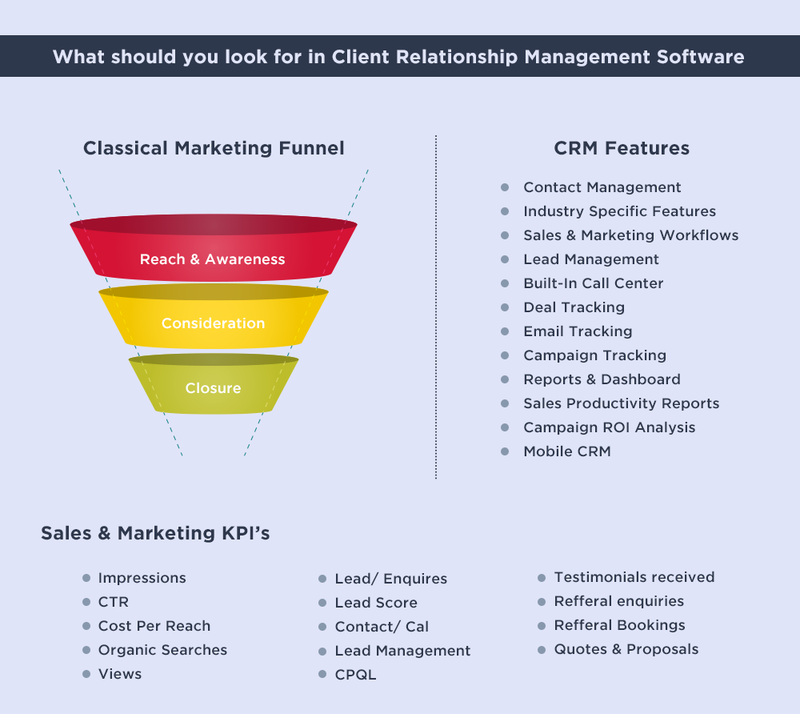In recent times, the business models have changed and have adopted a more customer-centric approach. Keeping a track of what your customers need, their solution requirements, technology preferences, access to information, and overall experience, this is the key to business success in current times. Customer Relationship Management (CRM) software, also referred to as Sales CRM software, allows businesses to manage, track, and engage with their marketing leads and offer them service them throughout their buying journey.
Why is it important to have a CRM in place?
In this digital age, be B2C or B2B, consumers have become more aware in the last 5 years than they were in the last 50 years due to the access of the internet. To build a brand and create a perception in your consumer’s mind, you need to know them closely and have data that can tell a story about their behavior. With this information, enterprises can create the right piece of communication with the necessary information and engage with customers uniquely through different sales-funnel stages.
Additionally, CRM keeps track of all in-person and digital touch points to check how better is your consumer serviced and provides conclusive insights about the performance of your marketing channels.
If enterprises fail to understand your consumer and their buying journey, they might lose them to the competition. Primitively, this process of capturing leads and engaging was done manually making it time consuming, cumbersome and unorganized. CRM software offers a much-organized approach to this. If you are exploring this space there are many valued SaaS firms that offer free CRM demo.
What a CRM system actually does?
Superficially talking, a Sales CRM does lead management by capturing leads through various online and offline marketing channels, organizing them and automating the flow of relevant information through communication mediums.
For sales, it helps representatives to organize their engagements with the leads based on their buying intent and convert them into a paying customer. Essentially, by automating quote and proposal management, setting up calls and scheduling meeting automatically, a CRM allows sales reps to focus on their sales pitch and closing deals instead of these operational tasks.
For customer services, CRM with call center integration allows businesses to offer constant support to their customer base and elevate their overall experience with the brand. The analytics that a customer relationship management (CRM) software offer, lets businesses understand their customer preferences on the medium of communication, time to contact, and create feedback structure for service and or product optimizations.
For marketing, again a CRM does all operational and analytical tasks like; executing email and SMS campaigns, track campaign performance, manage leads, provides analysis on marketing channel performance, lead qualification reports, sales performance, and engagement overview and generate data that helps measure overall RoI.
If you are exploring CRM for your business, consider having a look at the product’s reviews and ratings.
What should you look for in a CRM, what are the different types of CRM in the market?
Below infographic will provide a comprehensive idea about what features you must look for in a CRM.

Now, let us understand various types of CRM types and understand how they are classified.
Based on their functionalities CRMs are categorized into 4 types:
Vertical CRM: Based on the industry verticals like manufacturing, retail, real estate, pharmaceutical, and BFSI there are CRM tools that are developed or made specifically for a particular industry. All these vertical CRM software have features, workflows, and integrations pre-built as per the business and sales process of that particular industry vertical. If you are from the real estate industry, you can explore the features of a Real Estate CRM.
Operational CRM: An operational CRM is essentially a software that automates all the operational sales and marketing tasks, allowing sales and marketing functions to focus on their core tasks.
Sales Automation: With sales process automated as per lead journey, the sales cycle and closure are impacted positively. Sales automation takes care of contact management as well as the lead management by proper meeting and demo scheduling, Quote and proposal sharing, triggering events like email, and SMS to share relevant information as per lead journey.
Marketing Automation: on the other hand, will track campaigns, nurture leads with automated communications, auto lead scoring and profiling to help sales focus on quality leads, and track the performance of various marketing channels.
Explore the Generic CRMs available in the market:
-
Analytical CRM: An analytic CRM provides structured data along with analysis that will provide insights about marketing channel performance, consumer behavior and preference, sales performance, and productivity through customized reporting.
-
Strategic CRM: A strategic CRM involves multiple business functions including sales & marketing, finance, customer service, and project management. These CRMs have track and manage options, customer requirements, service request, financial transaction, and summary to understand customer lifetime value.
Enterprises exploring CRM must have a strategy and requirement checklist ready, this should be followed by a research and review trends of all available products.
While we have already provided a source for exploring generic CRM, Sell.Do is a vertical real estate CRM, exclusively built keeping real estate business process and sales cycle at its center. As a real estate CRM, Sell.Do offers features that make real estate sales and marketing easy.






Leave a comment
Comments (5)
Hi, this is a great blog on CRM system. It gives a clarity on how we can fine tune more of the business processes to see success.
Leave a ReplyShort and informative. Nicely written!
Leave a ReplyCRM is integral in digital transformation in real estate.
Leave a ReplyIs there a platform that offers a native mobile solution?
Leave a ReplyYes. Sell.Do CRM offers native mobile solution comprising of a plethora of features. - over 4 years ago
Great post!! I am so taken by your article that I'd like to share my views on it. This is the best real estate CRM software system platform as per the need of the customers to effectively manage your real estate business.
Leave a Reply